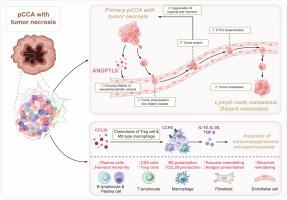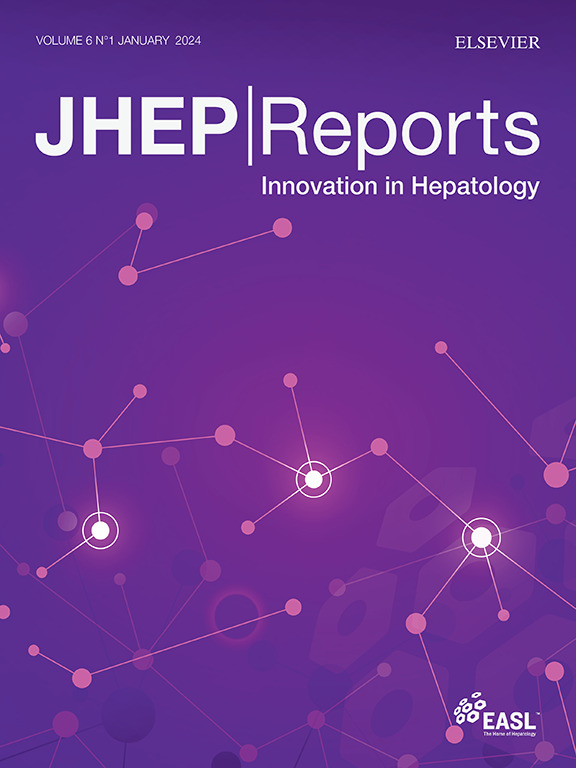肿瘤坏死通过angptl6增强血管通透性和肿瘤播散促进门周胆管癌转移
IF 7.5
1区 医学
Q1 GASTROENTEROLOGY & HEPATOLOGY
引用次数: 0
摘要
背景肿瘤坏死是实体瘤的病理特征,与预后差和侵袭性有关。然而,其在肝门周围胆管癌(pCCA)中的预后意义和潜在机制尚不清楚。本研究旨在探讨与pCCA肿瘤坏死相关的预后影响、临床病理相关性、分子调控和微环境改变。方法我们招募了306例符合条件的pCCA患者,评估病理性肿瘤坏死的预后影响和临床病理相关性。采用激光捕获显微解剖结合高分辨率质谱法鉴定坏死周围区域pCCA细胞的分子变化。进行单细胞RNA测序以阐明与肿瘤坏死相关的微环境改变。结果52.9%(162/306)的pCCA患者存在肿瘤坏死,是与不良预后(危险比1.42,95% CI 1.02-1.97, p = 0.039)、肿瘤播散、癌栓和侵袭性进展相关的独立危险因素。空间蛋白质组学鉴定血管生成素样6 (ANGPTL6)是一种肿瘤特异性蛋白,富集于坏死周围区域的pCCA细胞中。体外和体内研究表明,ANGPTL6通过增加血管通透性促进pCCA进展,导致肿瘤播散,增加转移负担,预后较差。此外,在pCCA肿瘤中发现病理性肿瘤坏死与免疫抑制微环境有关。结论病理性肿瘤坏死导致pCCA血管通透性增强和肿瘤播散。ANGPTL6是减轻pCCA转移性负担的潜在靶点。影响和意义病理性肿瘤坏死已被确定为肝门周围胆管癌(pCCA)的独立危险因素,与转移负荷正相关。空间蛋白质组学和体外/体内实验阐明了血管生成素样6 (ANGPTL6)通过增加血管通透性促进肿瘤扩散而对坏死肿瘤的有害作用。病理肿瘤坏死的pCCA肿瘤向免疫抑制微环境过渡。我们的研究结果为减轻pCCA的转移性负担提供了理论依据。本文章由计算机程序翻译,如有差异,请以英文原文为准。

Tumor necrosis facilitates perihilar cholangiocarcinoma metastasis by ANGPTL6-augmented vessel permeability and tumor dissemination
Background & Aims
Tumor necrosis is a pathological feature of solid tumors that is associated with poor prognosis and aggressive characteristics. However, its prognostic significance and underlying mechanisms in perihilar cholangiocarcinoma (pCCA) remain unclear. This study aimed to investigate the prognostic impact, clinic-pathological relevance, molecular regulation, and microenvironment alterations associated with tumor necrosis in pCCA.
Methods
We recruited 306 eligible patients with pCCA to assess the prognostic impact and clinic-pathological relevance of pathological tumor necrosis. Laser capture microdissection coupled with high-resolution mass spectrometry was used to identify the molecular changes in pCCA cells within peri-necrotic regions. Single-cell RNA sequencing was performed to elucidate the microenvironment alterations associated with tumor necrosis.
Results
Tumor necrosis was present in 52.9% (162/306) of patients with pCCA and was identified as an independent risk factor associated with adverse prognosis (hazard ratio 1.42, 95% CI 1.02–1.97, p = 0.039), tumor dissemination, cancer embolus, and aggressive progression. Spatial proteomics identified angiopoietin-like 6 (ANGPTL6) as a tumor-specific protein enriched in pCCA cells in peri-necrotic regions. In vitro and in vivo studies demonstrated that ANGPTL6 promoted pCCA progression by increasing vessel permeability, leading to tumor dissemination, increased metastatic burden, and poorer prognosis. Furthermore, pathological tumor necrosis was found to be associated with an immunosuppressive microenvironment in pCCA tumors.
Conclusions
Pathological tumor necrosis leads to augmented vessel permeability and tumor dissemination in pCCA. ANGPTL6 is a potential target for mitigating the metastatic burden in pCCA.
Impact and implications
Pathological tumor necrosis has been identified as an independent risk factor in perihilar cholangiocarcinoma (pCCA), showing positive correlation with metastatic burden. Spatial proteomics and in vitro/in vivo experiments elucidated the detrimental effects of angiopoietin-like 6 (ANGPTL6) in necrotic tumors through augmenting vessel permeability for tumor dissemination. A transition toward an immunosuppressive microenvironment was revealed in pCCA tumors with pathological tumor necrosis. Our findings provide a rationale for mitigating the metastatic burden in pCCA.
求助全文
通过发布文献求助,成功后即可免费获取论文全文。
去求助
来源期刊

JHEP Reports
GASTROENTEROLOGY & HEPATOLOGY-
CiteScore
12.40
自引率
2.40%
发文量
161
审稿时长
36 days
期刊介绍:
JHEP Reports is an open access journal that is affiliated with the European Association for the Study of the Liver (EASL). It serves as a companion journal to the highly respected Journal of Hepatology.
The primary objective of JHEP Reports is to publish original papers and reviews that contribute to the advancement of knowledge in the field of liver diseases. The journal covers a wide range of topics, including basic, translational, and clinical research. It also focuses on global issues in hepatology, with particular emphasis on areas such as clinical trials, novel diagnostics, precision medicine and therapeutics, cancer research, cellular and molecular studies, artificial intelligence, microbiome research, epidemiology, and cutting-edge technologies.
In summary, JHEP Reports is dedicated to promoting scientific discoveries and innovations in liver diseases through the publication of high-quality research papers and reviews covering various aspects of hepatology.
 求助内容:
求助内容: 应助结果提醒方式:
应助结果提醒方式:


